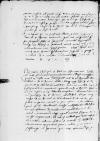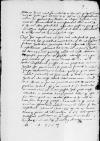Post ⌊⌋, quas ex ⌊castro meo Starigrod⌋ ad Dominationem Vestram Reverendissimam dedi, nullas a Dominatione Vestra Reverendissima vidi, neque etiam ad Dominationem Vestram Reverendissimam scribendi se obtulit commoditas, interim multis molestiis aflixionibus vexatus, quemadmodum a reverendissimo domino meo paper damaged⌈[o]o paper damaged⌉ ⌊Cracoviensi episcopo⌋ et ex litteris ⌊consiliariorum terrarum et civitatum Prussiae⌋ Dominatio Vestra Reverendissima intelliget. Rogo itaque sum paper damaged⌈[m]m paper damaged⌉mopere Dominationem Vestram Reverendissimam in tribulationibus meis, cum ms. qua(!)
⌈cumcum ms. qua(!)
⌉ fides et honor meus a ⌊provisore ⌊castri Mariembur paper damaged⌈[ur]ur paper damaged⌉gensis⌋⌋ falso traducitur, mihi adsit et illam summam in me veterem benevolentiam apud ⌊reverendissimum dominum meum Cracoviensem⌋ atque apud omnes ⌊Regni dominos⌋ mihi impartiat et non permittat, qui tam insigniter paper damaged⌈[er]er paper damaged⌉ ob eandem meam fidem et merita ⌊serenissimae maiestatis regiae⌋ clementiam expertus sum, adeo praepostere me perstringi ab homine, qui vix Graecam habet fidem.
 BCz, 244, p. 7
Mitto per hunc meum famulum Dominationi Vestrae Reverendissimae quinque simulacra picta, quae, ut reor, Dominationi Vestrae Reverendissimae non displicebunt. Velim mihi esse eas facultates, ut aliquo digniori munere ob humanitatem et munificentiam illam in me Dominationis Vestrae Reverendissimae adeo splendidam respondere possem, quae cum mihi adhuc desunt, propensum ad id animum et voluntatem Dominatio Vestra Reverendissima ut boni consulat, rogo.
BCz, 244, p. 7
Mitto per hunc meum famulum Dominationi Vestrae Reverendissimae quinque simulacra picta, quae, ut reor, Dominationi Vestrae Reverendissimae non displicebunt. Velim mihi esse eas facultates, ut aliquo digniori munere ob humanitatem et munificentiam illam in me Dominationis Vestrae Reverendissimae adeo splendidam respondere possem, quae cum mihi adhuc desunt, propensum ad id animum et voluntatem Dominatio Vestra Reverendissima ut boni consulat, rogo.
Quae hic apud nos per hos dies acta sunt et quae in novis ex partibus maritimis et de navigatione futura habentur, generosus dominus ⌊Achacius Czeme⌋ castellanus Gdanensis Dominationi Vestrae Reverendissimae exponet abunde, item exponet quaecumque nobis cum ⌊castri Mariemburgensis⌋ provisore ⌊domino Kostka⌋ intercesserunt, qui, cum meritus est, quod nemo bonus illi bene velit, ⌊dominos consiliarios Prussiae⌋ et me praesertim ⌊Polonorum⌋ hostes esse proclamat se Polonum faciens, in insula prope ⌊Mariemburgum⌋ natus, quasi si quis unum malum Polonum (ut sunt mali et boni ubique) odio habens ms. habent(!)
⌈habenshabens ms. habent(!)
⌉ ideo odisse debeat totam nationem. Aliud Dominatio Vestra Reverendissima et qui me penitius norunt de me compertum habent, quam quod me unius falsa traductio in omnium odium perducere possit. Hoc quod mihi intentat, a veritate diversissimum, utcumque esset ferendum, quod vero contra fidem et honorem nostrum omnino ferri nequaquam potest. Commendo itaque me et causam hanc omnium nostrum unacum generoso domino ⌊castellano Gdanensi⌋ Dominationi Vestrae Reverendissimae ex animo Deumque precor, ut nobis eandem Dominationem Vestram Reverendissimam quam diutissime incolumem et felicissimam conservet.
 BCz, 244, p. 7
Mitto per hunc meum famulum Dominationi Vestrae Reverendissimae quinque simulacra picta, quae, ut reor, Dominationi Vestrae Reverendissimae non displicebunt. Velim mihi esse eas facultates, ut aliquo digniori munere ob humanitatem et munificentiam illam in me Dominationis Vestrae Reverendissimae adeo splendidam respondere possem, quae cum mihi adhuc desunt, propensum ad id animum et voluntatem Dominatio Vestra Reverendissima ut boni consulat, rogo.
BCz, 244, p. 7
Mitto per hunc meum famulum Dominationi Vestrae Reverendissimae quinque simulacra picta, quae, ut reor, Dominationi Vestrae Reverendissimae non displicebunt. Velim mihi esse eas facultates, ut aliquo digniori munere ob humanitatem et munificentiam illam in me Dominationis Vestrae Reverendissimae adeo splendidam respondere possem, quae cum mihi adhuc desunt, propensum ad id animum et voluntatem Dominatio Vestra Reverendissima ut boni consulat, rogo.

